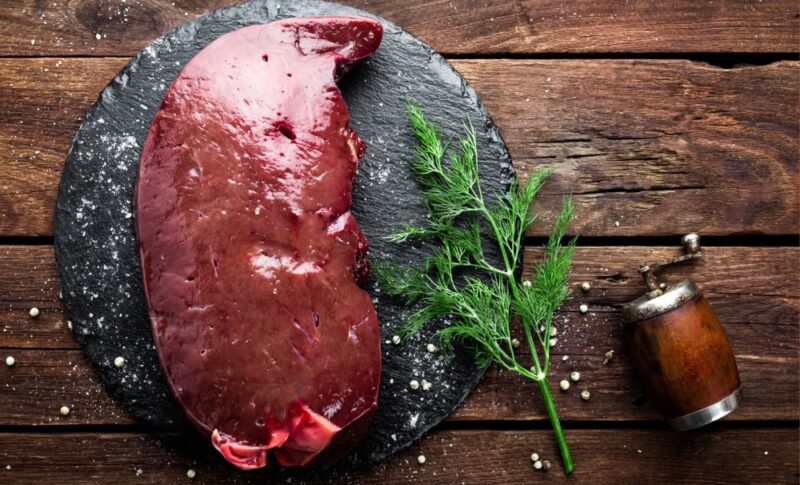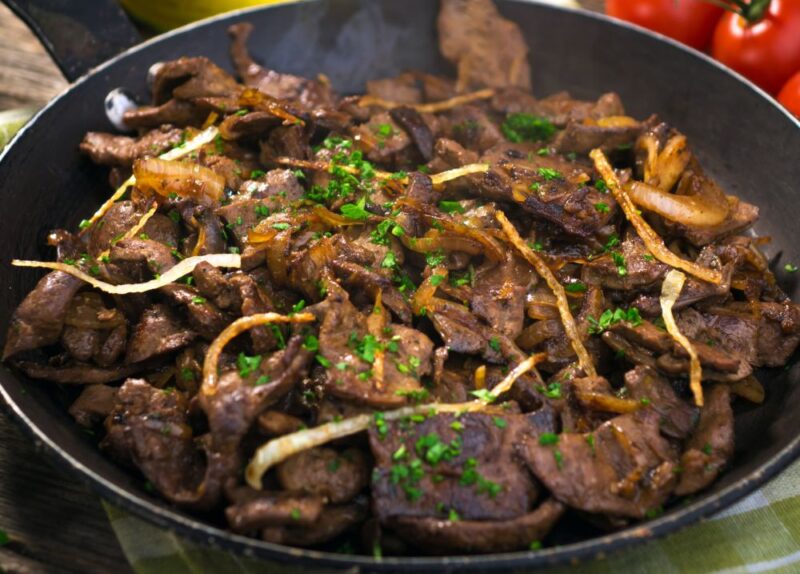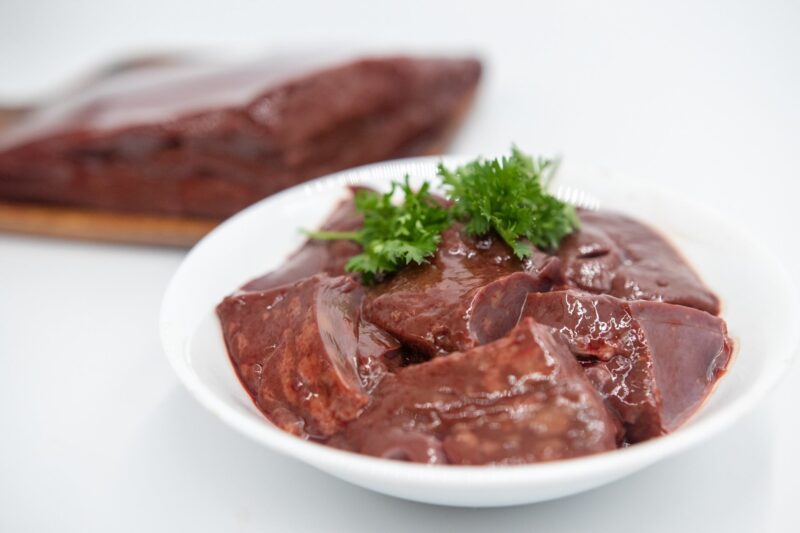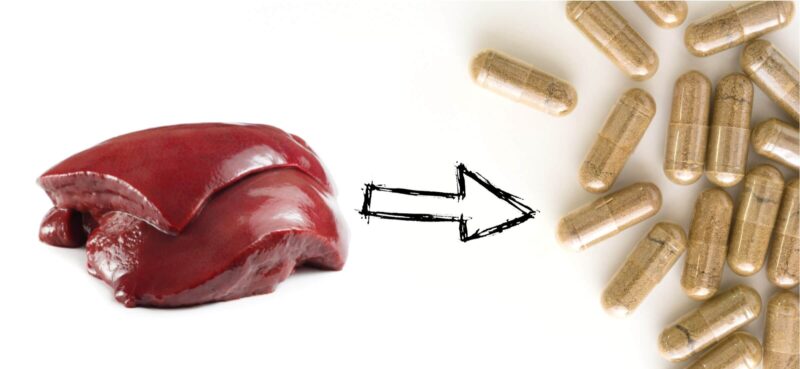As a health-conscious individual, I have always been curious about the idea of consuming raw liver. After all, raw foods are often praised for their nutrient density and potential health benefits. So, can you eat raw liver? Let’s delve into the facts and uncover the truth about raw liver consumption.
Key Takeaways:
- Raw liver consumption has been practiced for centuries.
- Beef liver is a highly nutritious superfood, rich in iron, B vitamins, vitamin A, and zinc.
- There are potential risks associated with eating raw liver, including bacterial contamination.
- Cooking liver helps eliminate harmful bacteria and retain essential nutrients.
- Alternatives like desiccated liver pills can provide the benefits without the taste or texture issues.
The Benefits of Eating Liver

Eating beef liver provides numerous health benefits due to its unique nutrient profile. It is an excellent source of vitamin B12, copper, vitamin A, riboflavin, choline, and iron. These nutrients support red blood cell production, immune function, vision, energy metabolism, brain health, and resilience against stress.
Vitamin B12, also known as cobalamin, plays a crucial role in the production of red blood cells and DNA synthesis. It is essential for maintaining healthy nerve function and supporting brain health. Copper is involved in energy production, collagen formation, and iron absorption. Vitamin A is important for vision, immune function, and cell growth and differentiation. Riboflavin, or vitamin B2, is necessary for energy metabolism and the maintenance of healthy skin, eyes, and red blood cells.
Choline is an essential nutrient that supports brain development, memory, and cognitive function. Iron is vital for oxygen transport throughout the body, preventing iron-deficiency anemia and promoting optimal energy levels. Finally, resilience against stress is enhanced by the combination of these nutrients, which support overall health and well-being.
| Nutrient | Function | Sources |
|---|---|---|
| Vitamin B12 | Red blood cell production, brain health, nerve function | Liver, meat, fish, dairy, eggs |
| Copper | Energy production, collagen formation, iron absorption | Liver, shellfish, seeds, nuts, whole grains |
| Vitamin A | Vision, immune function, cell growth and differentiation | Liver, eggs, dairy, orange and yellow fruits and vegetables |
| Riboflavin | Energy metabolism, healthy skin, eyes, and red blood cells | Liver, dairy, meat, eggs, legumes |
| Choline | Brain development, memory, cognitive function | Liver, eggs, meat, fish, nuts, legumes |
| Iron | Oxygen transport, preventing anemia, energy production | Liver, meat, fish, legumes, dark leafy greens |
How to Make Liver Palatable

If the taste and texture of liver are not appealing to you, there are various ways to make it more palatable. Here are some suggestions:
1. Make Liver Smooth and Salty with Pate
Pate is a popular option for transforming the taste and texture of liver. It involves blending cooked liver with butter, seasonings, and sometimes other ingredients like onions or garlic. The result is a smooth and flavorful spread that can be enjoyed on crackers or toast.
2. Bathe Liver in Tallow or Butter
Frying liver in tallow or butter can help enhance its flavor and add richness to the dish. The fat helps to tenderize the liver and provides a delicious coating. Pan-frying liver in fat with onions and herbs is a classic combination that can bring out the best in the liver.
3. Try Raw Liver in Small Portions

If you’re feeling adventurous, you can consume raw liver in small portions. Some prefer to thinly slice the liver or dice it into small cubes and eat it as is. It’s important to choose high-quality, fresh liver for raw consumption and ensure it has been properly handled and stored to minimize any potential risks.
4. Pan-Fry Liver and Onions
One popular way to cook liver is to pan-fry it with onions. The caramelized onions add sweetness and balance to the strong flavor of the liver. You can also add other ingredients like mushrooms or bacon to further enhance the taste.
5. Explore Liver Recipes
There are numerous liver recipes available that can help you incorporate liver into your diet in creative and delicious ways. From liver-infused meatballs to liver-blended burgers, there are options for every palate. Experiment with different recipes and find the ones that work best for you.
By using these methods, you can make liver more enjoyable and reap the health benefits it offers. Whether you prefer pate, pan-fried liver, or other liver recipes, there’s a way to include this nutrient-rich organ meat in your diet.
Be Aware of Risks and Consider Desiccated Liver Pills

While raw liver consumption may have its enthusiasts, it is important to be aware of the potential risks involved. One of the main concerns is the risk of bacterial contamination. Raw liver can contain harmful bacteria such as Salmonella or E. coli, which can lead to food poisoning and other health issues. Cooking liver thoroughly helps kill these bacteria and makes it safe for consumption.
Another factor to consider is the potential loss of nutrients when consuming raw liver. Cooking liver can help retain its essential nutrients, such as iron, vitamin A, and B vitamins. These nutrients are vital for various bodily functions, including red blood cell production, immune function, and overall well-being.
If the taste and texture of liver are not to your liking, there is another option to obtain the benefits without the taste or texture concerns. Desiccated liver pills are a convenient alternative. These pills are made from dehydrated liver, preserving the nutrients while eliminating the taste and texture issues. They can be easily incorporated into your daily routine, providing you with the essential nutrients found in liver.
Table: Risks of Eating Raw Liver
| Risks | Description |
|---|---|
| Bacterial Contamination | Raw liver can contain harmful bacteria, increasing the risk of food poisoning and other health issues. |
| Nutrient Loss | Cooking liver helps retain its essential nutrients, ensuring you receive the maximum nutritional benefits. |
| Taste and Texture | Some individuals find the taste and texture of liver unappetizing, making it difficult to incorporate into their diet. |
Conclusion
After exploring the health and nutrition facts of beef liver, it is clear that including liver in your diet can be highly beneficial. This nutrient-dense superfood provides a rich source of essential vitamins, minerals, and high-quality protein.
While raw liver consumption has its risks and may not be appealing to everyone, there are plenty of options to incorporate liver into your meals. Whether you choose to cook liver in different recipes, try desiccated liver pills, or explore other creative methods, you can still enjoy the benefits without compromising on taste or texture.
By adding liver to your diet, you can boost your intake of important nutrients such as iron, vitamin A, B vitamins, and zinc. These nutrients play crucial roles in supporting your immune system, vision, energy metabolism, and overall well-being.
FAQ
Can you eat raw liver?
While raw liver consumption has been practiced for thousands of years, it is important to understand the potential risks and safety considerations associated with it. Cooking liver helps kill harmful bacteria and retains its essential nutrients.
What are the health benefits of raw liver?
Raw liver is a highly nutritious superfood, packed with essential nutrients such as iron, B vitamins, vitamin A, and zinc. It supports red blood cell production, immune function, vision, energy metabolism, brain health, and resilience against stress.
How can I make liver more palatable?
There are various ways to make liver more appealing. You can make liver smooth and salty with pate, fry it in tallow or butter, consume it raw (thinly sliced or in small cubes), pan-fry it with onions and mushrooms, or try other liver recipes such as liver-infused meatballs or liver blended burgers.
What are the risks of eating raw liver?
Raw liver consumption carries the risk of bacterial contamination. Cooking liver helps kill harmful bacteria and ensures safety. If the taste and texture of liver are not to your liking, desiccated liver pills can be a practical solution to obtain the benefits without the taste or texture issues.
How can I include liver in my diet?
Whether you choose to cook liver in different recipes, try desiccated liver pills, or explore other options, adding it to your diet can provide you with essential nutrients and contribute to your overall health and well-being.

